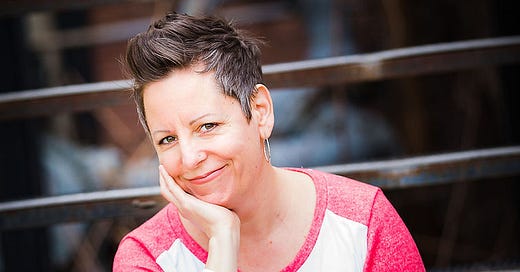Therapist/cancer survivor explains how to heal anxiety
Good news for dark chocolate and blueberry lovers
By Howard Wolinsky
Sarah Fenlon-Falk, LCSW, knows cancer and stress.
She had bone cancer as a teen. She spent her senior year of high school in the hospital being treated with chemotherapy for osteogenic sarcoma.
She had a double mastectomy for Stage 3 breast cancer as an adult.
She didn’t realize she was anxious, even as a child, until she tried as a medical social worker at Michigan State University. (Go Spartans.)
“It has actually been part of the experiences that have helped me learn how to heal anxiety and think differently about anxiety … before I was diagnosed with breast cancer,” said Fenlon-Falk, who spoke about “Making Peace with Anxiety,” to the Prostate Forum of Orange County on July 28.
The therapist from Homewood, Illinois (he next own over from where I live) recalled an incident when she was seeing a nurse about her anxiety issues relating to caring for her father who was dying from cancer.
Fenlon-Falk said that she started feeling lightheaded during the session and thought she was having low blood sugar issues.
Her patient, the nurse, insisted that she go to the hospital in an ambulance. STAT.
It turned out Fenlon-Falk was having a panic attack.
“I had to take a really hard look at what was happening and really what it was was this my stress reaction which was triggered because all day long I was listening to cancer stories,” she said.
She quit what she considered her “dream job” to deal with her own issues. She became a coach and therapist specializing in anxiety and panic attacks.
She said she explains to her clients that “they’re not ever going to get rid of anxiety. “Here's why: Anxiety is a built-in survival instinct for you."
“We all have it and we all experience it in different ways like on a spectrum” from low to high anxiety.
Fenlon-Falk said people need to learn how to manage their stress reactions, recognize when they are not in immediate danger, and shift their mindset.
Let’s translate this into terms patients on active surveillance can relate to.
For example, for those of us on active surveillance for prostate cancer, anticipating visits to the urologist for an annual exam or awaiting results from an MRI or biopsy can trigger anxiety.
We call this anxious surveillance.
Some patients find anxiety intolerable and conclude they need to undergo “definitive treatment.” In other words, obliterate the prostate gland with surgery or radiation unnecessarily and expose yourself to the risk of impotence and incontinence.
A therapist told me once: Prostatectomies don’t cure anxiety. Neither does radiation therapy.
(Therapist and coach Sarah Fenlon-Falk)
Fenlon-Falk said patients with anxiety need to take intentional steps to achieve a relaxation response.
Among the strategies she mentioned:
—Take a deep breath to relax. Put your hand underneath your belly button and that's where you want to breathe from. You don't want your shoulders to rise and fall with every breath. You want your abdomen to expand and contract with each breath. This stimulates nerves in the abdomen that activate the relaxation response. She urges you to practice. Don’t wait until anxiety and panic hits. Build those relaxation muscles.
—Eat blueberries, avocados and dark chocolate. The chemical response can prevent or reduce anxiety. Seriously. “I always have blueberries on hand. And dark chocolate,” she said.
—Managing thoughts by putting them on paper can be very helpful.
—Use relaxing breathing and movement exercises. Fenlon-Falk is a fan of qigong, an ancient Chinese exercise that stands by itself or as a warm-up exercise for full-fledged tai chi. She recommends Qigong for Vitality at https://www.qigongforvitality.com/
You gently move, stretch, breathe, and clear those cobwebs. She does qigong with her sons before sending them off to school each day.
I did qigong for years. I don’t know why I stopped. I am inspired to return to my qigong practice. Got to move that chi.
Thanks to my friends at the Prostate Forum of Orange County for sponsoring this program. Go with the flow and view the program at: https://www.prostateforum.org/presentations
AnCan’s Virtual Support Group for Patients on Active Surveillance is holding a program, “Prostate Cancer Biopsies...The Great Debate,” on whether transrectal biopsies or transperineal biopsies are better for patients.
The program will be 8-9:30 p.m. Eastern on August 29. Register here: https://bit.ly/3OJ9Mmu
Deborah Kaye, MD, Assistant Professor Duke UniversityDivision of Urology and Duke Clinical Research Institute Margolis Policy Center, will argue for transrectal biopsies. Arvin George, MD, a urologic surgeon specializing in the diagnosis and management of genitourinary cancers at the University of Michigan Health, will argue for transperineal procedures.
Co-sponsors include ASPI, Prostate Cancer Support Canada, the Prostate Forum of Orange County, and TheActiveSurveillor.com.
Please submit questions in advance to moderator Joe Gallo at joeg@ancan.org
View Dr. William Li’s webinar on diet and prostate cancer to Active Surveillance Patients International : https://aspatients.org/meeting/eat-to-beat-prostate-disease/
\
Also, let’s spit for science wih a free DNA test for patients with prostate cancer. Check this out:




